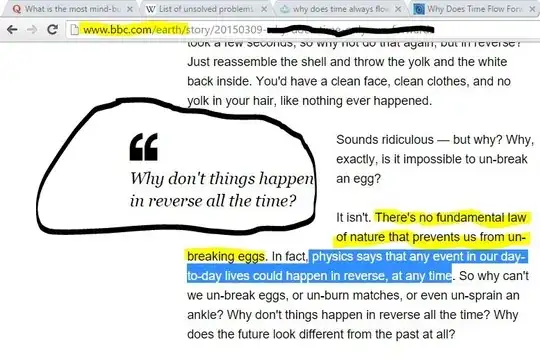According to the BBC Earth " Physics says that any event in our day-to-day lives could happen in reverse, at any time".Then why can't we just turn time backwards?
2 Answers
So far there is no definitive answer as to why time flows forward. While many scientists speculate what may the cause of this asymmetry in time none of the options has been accepted as the one answer. Often these ideas lack a complete understanding of the underlying more complex principles that we cannot yet understand but here is one of the most common theories:
- The second law of thermodynamics is responsible for the time arrow. The universe tends towards higher entropy (disorder) because it is more likely. This is why we can only "move" in one direction. There are for example millions of ways to break one egg but there is only one way to arrange all the particles to make that one egg. It is so extremely unlikely that the egg would rebuild from its shattered form that it is virtually impossible. However, this theory has some flaws inherent to it and while it may be a candidate for explaining the time arrow phenomenon, the role of entropy in our universe itself is not fully understood.
Brian Greene discusses the "time vector" in his book, The Fabric of the Cosmos, which makes for a great read if you have these kinds of questions.
- 2,413
The big bang theory predicts that there will be an arrow of time and a lot of scientists agree that the universe started from a big bang. One attempted more complete explanation I saw before was that the big bang created a tendency for entropy to increase. I think that explanation is not correct because according to Bubble's answer to The statistical nature of the 2nd Law of Thermodynamics, the second law of thermodynamics hasn't been proven to be an absolute law.
Here's my theory on why there's an arrow of time. After the big bang started, following the time symmetrical fundamental laws created chaotic tendencies. Although time is continuous, we can still consider only times that are a multiple of a certain very short time unit after the big bang and explain the state of the universe at each one of them in terms of the state at the previous one of them. Let's consider a solid with an uneven distribution of heat at a certain time. The big bang set it into a time asymmetric state where heat diffuses randomly going to the next state but not going to the previous state. That state also leads the state at the next time to be time asymmetric where heat has a tendency to diffuse randomly going to the state after it but not going to the state before it.
- 1,708